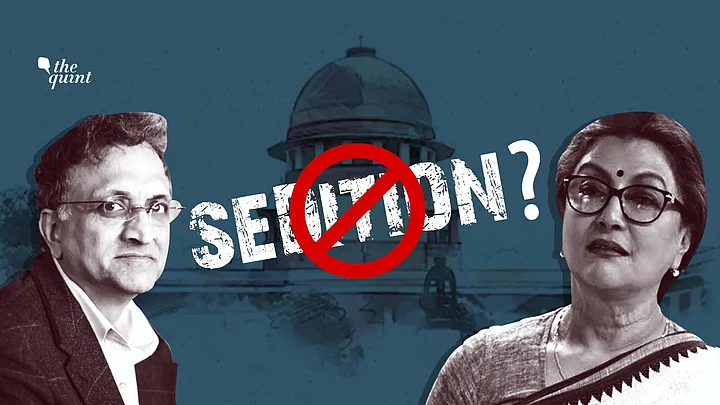‘Freedom of speech’ is a raging topic, yet again. The storm began with the Bihar Police filing an FIR against 49 citizens under various sections of the Indian Penal Code for their letter to the prime minister. In its wake, six students of Wardha University were allegedly expelled for organising a mass event to write letters to PM Modi, protesting against the FIR.
In this season of letters, as a concerned citizen, I also wrote an open letter to our prime minister, in protest against the malicious FIR. Though better sense prevailed and the FIR was later withdrawn, I feel that the issue cannot be shoved under the carpet. It happened once; it can happen again. In the spirit of a healthy democracy, it needs to be discussed.
Don’t Forget: ‘Dissent Is the Safety Valve of Democracy’
What was the crime of these individuals that called for such an intervention by the police and judiciary? All that these public-spirited citizens had done was write a letter to the PM, urging him to take action against the rising number of lynchings happening across India. They also asserted that there is no democracy without dissent.
Article 19(1)(a) of the Indian Constitution guarantees every citizen of India the Fundamental Right to freedom of speech and expression. Our founding fathers did add some limitations. Clause 2 of Article 19 imposes reasonable restrictions on the fundamental right: “In the interests of the sovereignty and integrity of India, the security of the State, friendly relations with foreign States, public order, decency or morality or in relation to contempt of court, defamation or incitement to an offence”.
Much debate happened in the Constituent Assembly on the validity of the restrictions, but not on the right itself, because it was a given that a democracy can survive only if there is free and fair exchange of ideas.
This was also observed by the Chief Justice of India in the landmark case of Romesh Thapar v. State of Madras: “Freedom of speech and of the press lay at the foundation of all democratic organisations, for without free political discussion no public education, so essential for the proper functioning of the process of popular government, is possible”.
Further, last year, the Supreme Court upheld the right of citizens to dissent and stated, “Dissent is the safety valve of democracy”.
Freedom of Religion: India Ranks Among the Worst
Exercising this fundamental right, in July, the 49 concerned citizens wrote to PM Modi to highlight the alarming rise in the number of mob lynching in the country. According to Human Rights Watch, 44 people were lynched from 2015 to 2018. During the same period, there were at least 111 cases of mob violence across India. These were mostly targeted at Dalits, Muslims, and other minorities.
Mob violence has also been triggered by fake news about supposed child kidnappings, circulated via WhatsApp.
Our founding fathers envisaged a nation that is rich in diversity of thoughts, culture, religion, and tradition. Throughout history, we have always taken pride and celebrated our pluralism. However, in the last few years, we are witnessing the muzzling of dissent, the murders of rationalists, and an increase in hate crimes.
The growing communal tensions has caused a deep impact on the social fabric of our country.
As per the latest report by Pew Research Centre on religious freedom, India ranks as one of the worst countries on freedom of religion. On the Social Hostilities Index (SHI) section of the report, which measures communal hostilities around the issue of religion, India is the worst performing country with the highest number of social hostilities recorded.
Ruling Govt’s Tacit ‘Approval’ of Lynching
In 2015, Mohammed Akhlaq was lynched in Dadri on the mere suspicion of storing and consuming beef. For more than a week, there was no condemnation from the government or the ruling party. In fact, some leaders of the BJP made incendiary remarks. It was only after much criticism that the prime minister broke his deafening silence and talked of communal harmony. However, he fell short of an outright condemnation. The message was loud and clear.
It became clearer last year when Jayant Sinha, then a Union Minister, garlanded eight men convicted for lynching in Jharkhand.
Later, the minister also revealed in an interview, that the BJP helped with the legal fees of these accused. Another BJP parliamentarian from Jharkhand, Nishikant Dubey, said he would bear the legal expense of those accused in the lynching of two Muslim cattle traders.
These acts gave a sense of impunity to the criminals and signalled to the BJP’s tacit approval of lynching. Out of the 23 hate crimes in 2019, 15 are in the state of Jharkhand. This summer, again in Jharkhand, Tabrez Ansari was thrashed for hours and forced to chant ‘Jai Shri Ram’ for allegedly stealing a motorcycle.
What PM Modi Must Do to Restore Faith in Democracy
Such developments prompted the 49 concerned citizens to write to the prime minister, to use his moral authority to put a stop to such crimes — and earned an FIR for their efforts. Since the intent of the FIR was to penalise those who wrote to the prime minister, it is appropriate for him to take a public stance welcoming dissent, and assuring the nation of his commitment to uphold freedom of expression.
In the Constituent Assembly, fighting for this freedom, Damodar Seth said, “To suspend civil liberties is tantamount to a declaration of martial law”.
Civil liberties are paramount in a democracy. A clear statement by the prime minister, welcoming dissent, would be timely and would reassure Indian citizens that our democratic freedoms are still alive.
(Prof. M. V. Rajeev Gowda is a Congress Member of Parliament. He tweets @rajeevgowda. This is an opinion piece, and the views expressed are personal. This is an opinion piece and the views expressed above are the author’s own. The Quint neither endorses nor is responsible for the same.)
